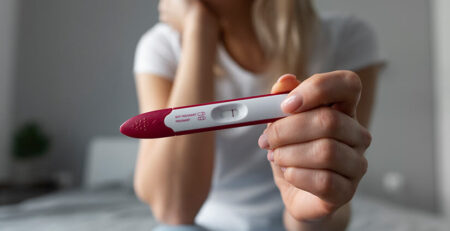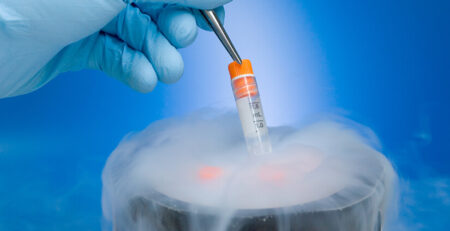Cervical Mucous Test
Due to formation of egg, hormone called estradiol is released in the body, this liquifies the normal discharge from female tract which maximises the penetration and travel of sperm to reach the egg. A women can notice this change in consistency of the discharge and time intercourse accordingly. But this is not very reliable. Better and more accurate methods are also available.
LH Kits
These are kits like pregnancy test kits available by different manufacturer which help to predict egg rupture 12- 24 hrs before. All you need to do is start using the kit from day 11 of the cycle in afternoon. Put 2-3 drops of urine in the marked area on the kit and wait of a minute for the result, a single line would indicate negative result and two pink lines positive, indicating impending egg release in next 12- 24 hrs and hence the couple should have intercourse on the day of positive LH test and the subsequent day. Usually, egg is released on day 14 in a regular 28-day cycle and on day 16 in a 30 day cycle.
Ultrasound For Follicle Monitoring
This is is the surest of all modalities helping in predicting egg release prospectively. Usually used in stimulated cycles wherein some medicine in given to the women for initial 5 days of the cycle to help egg formation or to time intrauterine insemination. In a regularly menstruating women follicle monitoring started from day 10/12 of the cycle, a healthy follicle grows at rate of 2mm/day and endometrial lining at 1 mm/day and it reaches a size of 18-20 mm before rupture and release egg. A trigger injection can also be given at this mature size to rupture the follicle artificially and time intercourse or intrauterine insemination accordingly.
Progesterone Test
A simple blood test done on day 21 of the cycle or later can tell about ovulation but will not help to time intercourse in the ongoing cycle.
Progesterone test is done to measure the levels of hormone progesterone (a female hormone produced by the ovaries during ovulation) in a blood sample. Progesterone prepares the uterus lining to receive the egg after it has been fertilized by a sperm. If the received egg is not fertilized, the levels of progesterone drop causing the menstrual cycle to begin.
Why is it done?
A progesterone test is done to:
- Check whether ovulation is occurring
- Monitor the success of infertility medicines
- Monitor the effects of treatment with progesterone
- Assess the risk of miscarriage







